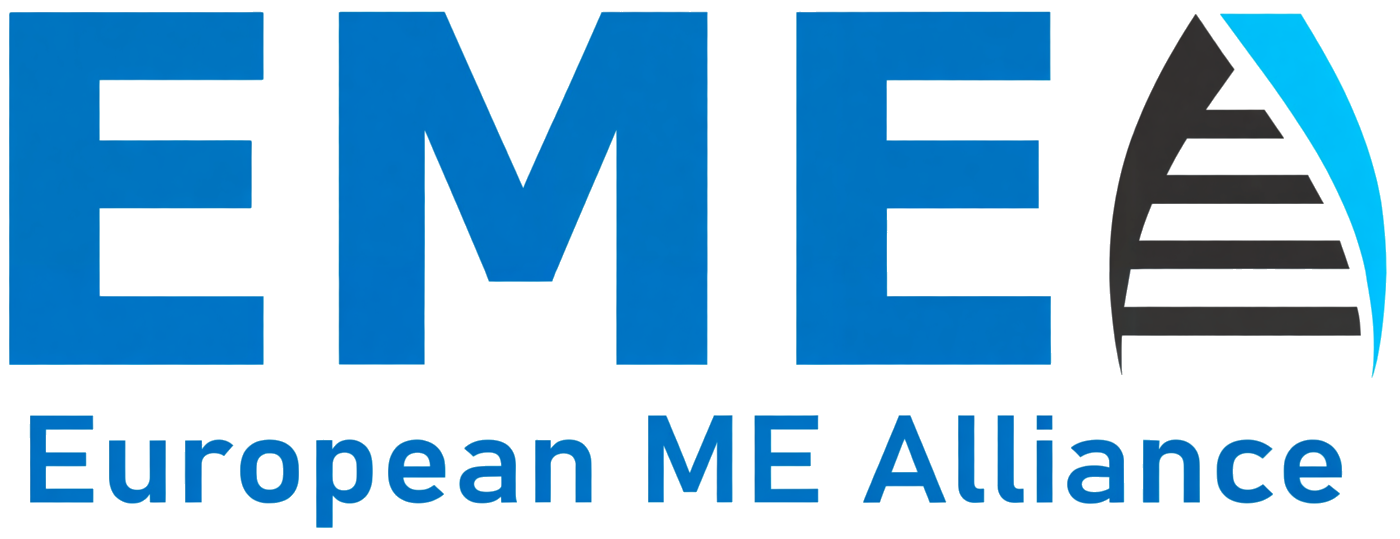Virtual event overview
In June 2021 EMEA and EFNA (European Federation of Neurological Associations) arranged the first multi-stakeholder, roundtable meeting on
Myalgic Encephalomyelitis (ME/CFS) in Europe.
The meeting brought together a variety of initial stakeholders in Europe, including clinicians, researchers, policy makers,
industry and patient representatives from EMEA's members, in order to
create a better understanding of the many unmet needs and the devastating impact of ME/CFS on patients and families across generations.
The meeting also included discussions on the implications of Long COVID - including similarities to ME/CFS.
The video of this event is below - click here.
Agenda
The agenda for this first meeting was as described is below.
This first European roundtable for ME/CFS was dedicated to the life and work of Anne Örtegren

00:15 - 01:52

Mohammed Chahim MEP
Mohammed gave an introductory speech and gave support for EMEA and for research into rare and complex diseases such as ME/CFS.
Mohammed Chahim is a Dutch politician of the Labour Party who has been serving as a Member of the European Parliament since 2019. Chahim has been a Member of the European Parliament since the 2019 European elections
01:56 - 06:49

Donna Walsh
Donna gave the introduction to the roundtable webinar on behalf of EMEA and EFNA.
She summarised the objectives behind this first webinar.
Donna became the Executive Director of EFNA in June 2012. Donna’s training is in Journalism, but she has worked with patient organisations in the neurological sector –
in various roles – since leaving university.
This included work with the European Migraine and Headache Alliance [EMHA] and the Migraine Association of Ireland [MAI], as well as being a representative to
the Neurological Alliance of Ireland.
06:55 - 16:40

Anne Örtegren
The Realities of ME - Anne Örtegren A video made from Anne's "Last Post" Warning - content may be upsetting for some
18:00 - 20:38

Dr. Tedros Ghebreyesus - Opening Keynote Contribution
Dr Tedros was unfortunately not able to join in person due to another important engagement but he sent a video message in support of the work of EMEA and EFNA in this area, within the context of the current covid-19 pandemic, and recognition of the long-term effects of post-viral illness by WHO, and the need for follow-up care.
Dr. Tedros Adhanom Ghebreyesus was elected as WHO Director-General for a five-year term by WHO Member States at the Seventieth World Health Assembly in May 2017. He is the first WHO Director-General to have been elected from multiple candidates by the World Health Assembly, and is the first person from the WHO African Region to serve as WHO’s chief technical and administrative officer. Immediately after taking office on 1 July 2017, Dr. Tedros outlined five key priorities for the Organization: universal health coverage; health emergencies; women’s, children’s and adolescents’ health; health impacts of climate and environmental change; and a transformed WHO. Born in the city of Asmara, Eritrea, Dr. Tedros holds a Doctorate of Philosophy (PhD) in Community Health from the University of Nottingham and a Master of Science (MSc) in Immunology of Infectious Diseases from the University of London. Dr. Tedros is globally recognised as a health scholar, researcher, and diplomat.
21:25 - 37:12

Dr. Catherine Berens - European Commission Research and Innovation - EU Activities in Brain Research
An overview of what the European Commission was planning in the brain research area.
Dr Berens discussed the support for brain research from the European Commission research budget.
She mentioned some projects that had been funded although not always successfully.
Dr Berens confirmed that no specific funding would be given to ME/CFS - something which was always obvious. However, she mentioned the
new opportunities where funding may be allocated for research into a subset of conditions, which might include ME/CFS.
Instead there would be a scoping exercise to tackle understudied medical conditions.
Dr. Catherine Berens was trained as a pharmacist and obtained her PhD in Pharmaceutical Sciences from the University of Louvain in Belgium. After having worked for the European Directorate for the Quality of Medicines (European Pharmacopoeia, Council of Europe, Strasbourg), she joined the European Commission in Brussels in 2002. She has since then been the Scientific Officer in charge of Rare Diseases in the Major Diseases Unit of the Health Directorate, Directorate General for Research.
41:10 - 51:50

Kerstin Heiling - Issues for European patients with ME/CFS
Kerstin described the European ME Alliance and presented the usual scenarios for how ME/CFS patients are treated.
An overview of available facilities and length of time for diagnosis was presented.
The consequences of the way patients were treated was presented.
Suggestions on what needs to be done were made.
Kerstin Heiling is Chairman of Riksförbundet för ME-patienter, Sweden
52:05 - 59:56

Professor Jonas Bergquist - Issues for Researchers and current lines of research to find causes/treatments
Professor Bergquist represented the European ME Research Group (EMERG) to discuss the issues faced by researchers in this disease.
He discussed current research areas and plans for the future.
Professor Jonas Bergquist is a MD-PhD and since 2005 appointed chaired professor of analytical chemistry and neurochemistry
at the Department of Chemistry - BMC, Uppsala University.
He has a background from Clinical Neuroscience at the Sahlgrenska University Hospital and Gothenburg University
(PhD and associate professor) and moved to Uppsala in 1999.
Since 2011 he has been adjunct professor of Pathology at the University of Utah, Salt Lake City, USA, and since 2015 professor of Precision Medicine, Binzhou Med Univ, China.
Jonas has been a founder member of EMERG when it was formed in 2015.
01:00:08 - 01:09:25

Professor Kristian Sommerfelt - : Issues for Clinicians and those tasked with treating people with ME/CFS in Europe
Professor Sommerfelt discussed the issues for clinicians.
He discussed the problems currently experienced by both clinicians and patients - especially children.
Professor Kristian Sommerfelt is a paediatric neurologist at Haukeland University hospital in Bergen, Norway
Professor Sommerfelt wrote the national guidelines (2019) for diagnosis, treatment and follow-up of ME/CFS children/ young people for the website NEL (Norsk Elektronisk Legehåndbok) - which is a web-based methods used the most by general practitioner doctors and also used extensively in hospitals.
Over the last eight years he has given lectures and presentations at courses and conferences for health professionals and others in addition to teaching medical students.
01:09:35 - 01:24:50

Frédéric Destrebecq - An EU policy perspective on brain research and health
Frédéric discussed the work of the European Brain Council and its policies toward brain disorders.
Frédéric Destrebecq is the Executive Director of the European Brain Council since October 2014. In this capacity, he is responsible for providing strategic direction and leadership while managing the day to day operations of EBC and its ongoing relationships with its member associations and other stakeholders, as well as representing the organisation in various European and national forums.
Prior to this position, Fred served the European Union of Medical Specialists (UEMS) as Chief Executive Officer, and previously as Director for European Affairs. Fred holds a Master Degree in Political Science and International Relations from the Université Catholique de Louvain (Belgium). He also studied at the Institut d’Etudes Politiques (Paris) and University of Wales College (Cardiff), in the framework of the former EU Socrates exchange programme.
01:25:00 - 01:38:00

Dr Tomislav Sokol - Patients’ Rights in Europe
Dr Sokol emphasised the importance of not neglecting other diseases at this time when covid-19 was taking all of the priorities.
He spoke in general terms about European Union healthcare policies.
He said that healthcare was primarily a national responsibility - the EU can support national actions but cannot harmonise standards but can
finance and support and help in improving the situation in member states.
Tomislav Sokol was born in Zagreb in 1982. He obtained his initial degree in law at the University of Zagreb Faculty of Law in 2006, magna cum laude. He obtained an LL.M. degree at the Katholieke Universiteit Leuven (KUL) in Belgium, with a specialisation in European Union Law in 2009, magna cum laude. He defended his Ph.D. at KUL, dealing with free movement of cross-border health care services in the EU and its impact on national health insurance systems in 2014.
During his studies, in 2004, Tomislav Sokol became a member of Croatian Democratic Union (HDZ). He rose through the party ranks during the next decade, always emphasising Christian Democratic values as the cornerstone of its identity. He was an Assistant Minister in the Ministry of Science and Education, after which he became a Member of Croatian Parliament. He was a Member of Croatian Parliament until July 2019 when he became a Member of European Parliament. He sits on the Internal Market and Consumer Protection and Regional Development Committees.
He has so far published numerous papers and one book on the issues concerning EU law, including health law, health policies and patient mobility. He has presented papers in many international conferences, worked on different research projects and is currently taking part in a Jean Monnet project related to EU health law and policy. Previously, he worked in a legal practice and is currently a Senior Lecturer at Zagreb School of Economics and Management where he has taught Introduction to European Union and Principles of Law courses since the academic year 2010/2011. He is also an assistant professor at Catholic University of Croatia where he is teaching Health Law. In 2017, he held the position of Assistant Minister at the Ministry of Science and Education. From September 2017 to July 2019, he was a MP in the Croatian Parliament. He was elected to the European Parliament on 25 May 2019. In the European Parliament, he is a member of the Committee on the Internal Market and Consumer Protection, substitute in the Committee on Regional Development and Special Committee on beating cancer. His areas of professional interest include the law of the European common market, EU health law, competition law, international and European social law and international and European trade law. He has been married to Ana since 2018.
01:39:46 - 01:47:11

Dr Beata Dela-Jaworska - COVID-19 - Similarities of ME/CFS and Long Covid from the front line
Dr Dela-Jaworska discussed her findings from examining ME/CFS and Covid-19 patients and the consequences of contracting covid for a large number of patients.
Dr Beata Dela-Jaworska is a GP with special interest in ME/CFS. She is a member of the European ME Research Group and the European ME Clinicians Council.
01:48:08 - 02:03:20

Tolulope Osigbesan - Long Covid Policy
Tolulope spoke of the Non Communicable Disease Alliance (NCDA) strategy and their work on Long Covid and key messages from their recent position paper.
Tolu joined the NCD Alliance in Geneva in 2019 to further develop NCD Alliance’s strategic relations with WHO, United Nations agencies and member state missions.
She is also supporting development of NCDA membership and partnerships across civil society, private sector and academia.
Before joining the NCDA, she worked in both the public and private health sectors in Nigeria.
Her most recent role was with the secretariat of United Nations Interagency Taskforce for Noncommunicable Diseases (UNIATF).
Tolu is a Pharmacist by training and is working towards a Masters degree in Public Health from the London School of Hygiene and Tropical Medicine.
02:06:28 - 02:16:45

Associate Professor Raimund Helbok - EAN ENERGY registry on COVID-19
Associate Professor Helbok gave a presentation of the work of EAN's Covid-19 taskforce and future initiatives.
Raimund Helbok, MD, PD, is associate professor of Neurology and a specialist in neurocritical care at the Neurological Intensive Care Unit t Medical University of Innsbruck in Innsbruck, Austria.
Dr. Helbok completed his medical training at the Medical University of Innsbruck and obtained a master’s degree in Clinical Tropical Medicine at Mahidol University in Bangkok, Thailand. After his training in General Medicine and Neurology, he conducted his research fellowship at the Division of Neurocritical Care, Department of Neurology, at Columbia University Medical Center in New York.
Dr. Helbok’s clinical practice covers the spectrum of neurocritical care, including the management of ischemic and hemorrhagic stroke, subarachnoid hemorrhage, traumatic brain injury, status epilepticus, neuromuscular diseases, autoimmune encephalitis and neuroinfectious diseases.
02:17:23 - 02:31:10

Dr Vicky Whittemore - Lessons from USA
Dr Whittemore spoke of the challenges in researching ME/CFS, the opportunities and the lessons learned from the work by the NIH.
Dr. Whittemore is a Program Director in the Synapses, Channels and Neural Circuits Cluster. Her interest is in understanding the underlying mechanisms of the epilepsies including the study of genetic and animal models of the epilepsies. The major goal is to identify effective treatments for the epilepsies and to develop preventions. Dr. Whittemore received a Ph.D. in anatomy from the University of Minnesota, followed by post-doctoral work at the University of California, Irvine, and a Fogarty Fellowship at the Karolinska Institute in Stockholm, Sweden. She was on the faculty of the University of Miami School of Medicine in The Miami Project to Cure Paralysis prior to working with several non-profit organizations including the Tuberous Sclerosis Alliance, Genetic Alliance, Citizens United for Research in Epilepsy (CURE), and the National Coalition for Health Professional Education in Genetics (NCHPEG).
02:31:35 - 02:43:25

Dr Sabine de Jong - A European government model initiative for research and development in ME/CFS
Sabine gave an overview of the work carried out by the ZonMW team in developing a project for funding a strategy of research into ME/CFS in the Netherlands which was recently given funding approval to proceed.
Programme manager, Disability/Chronic illness, The Netherlands Organisation for Health Research and Development (ZonMW)
02:43:45 - 02:52:30

Dr. Jan Schadrack - The Challenges for the Pharmaceutical Industry of an under-recognised disease such as ME/CFS
Dr Schadrack presented views from an industry perspective, the needs and impact of disease.
The biggest challenge for something like ME/CFS is reminiscent of previous diseases that struggled
in the past - where multiple elements serve the final goal - is the neurobiology and where once can find an entry point - from a scientific viewpoint .
Jan joined Roche PDMA in 2015 and serves as the TA Head Neuroscience and Rare Diseases. Jan is very passionate about Medicine and Neuroscience and strongly believes that the possibilities of the digital/data age will rapidly transform the science and clinical practice especially of Neurology and Psychiatry Diseases including related rare diseases.
He is strongly inspired by how this will bring better solutions for patient care, the medical community and ultimately society as a whole.
Jan is an MD PhD and specialized in psychiatry and neuropharmacology. In the biopharmaceutical industry he held various Clinical Development and Medical Affairs roles and gained longstanding and profound experience in Neuroscience - having worked across many Neurology and Psychiatry disease areas with Novartis, Bristol-Myers Squibb, Johnson & Johnson, and most recently with Biogen, before joining Roche.
02:52:35 - 02:57:00

Docent Jens Boman - Starting an advanced ME/CFS clinical hospital based service - standards, organisation, education and information
Docent Boman gave a presentation on the setting up of an advanced clinic for ME/CFS in Sweden.


